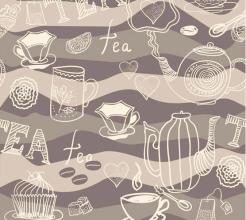Full-bodied Yunnan Tieka Coffee Flavor and Taste introduction to the characteristics of Fine Coffee in Manor area
Coffee is a short-day plant. Coffee has the characteristics of multiple flowering and concentrated florescence. The florescence of small seed coffee in Yunnan is from February to July, and the flowering period is from March to May. The flowering of coffee is greatly affected by climate, especially rainfall and temperature. Coffee flowers have a short life span of only 2-3 days. Small seed coffee usually opens at 3: 5 in the morning and blooms from 5 to 7 o'clock.
The development time of coffee fruit is longer. It takes 8 to 10 months for the fruit of small seed coffee to mature, usually from October to December of the year. Rainfall has a great influence on fruit development, and climatic conditions directly affect fruit development.
Small coffee berries
Small coffee berries
The two classic high-quality coffee varieties, Typica and Bourbon, are the main coffee varieties in Yunnan, and the Katimo Catimor series were introduced from Kenya in 1991 (stronger anti-virus ability and higher yield). A variety of Arabian species (also known as small seed species). Because the morphology and habits of the two varieties are similar, the two varieties are mostly mixed.
Tibica coffee, native to Ethiopia and southeastern Sudan, is the most widely cultivated variety of coffee in the Western Hemisphere. The plant is stronger, but not light-tolerant, and the yield is higher in Hawaii. The top leaf of Tibika is red and copper, which is called red top coffee.
Bourbon coffee is a variety of small-grain coffee second only to Tibica. At first, the main branch and the trunk grew upward at 45 degrees, and drooped with fruit load, the lateral branches were denser, the fruit was more, and the yield was higher. But the berries are smaller and ripen more slowly. The top bud of Bobang is green, which is called green top coffee.
Cardamo Catimor is an improved variety of Tibika species. 25% Robusta of genetic small-grain coffee is suitable for growing in the mountains at an altitude of 800m to 1800m. If the altitude is too high, it will taste sour, and if it is too low, it will taste bitter. Small grains of coffee are mostly planted in dry and hot valleys about 1100 meters above sea level, so they are moderately sour, rich and mellow. There is a unique environment suitable for the growth of small seed coffee in many areas of Yunnan, and the quality of small seed coffee is excellent.
The planting areas are mainly distributed in Lincang, Baoshan, Simao, Xishuangbanna, Dehong, Nujiang and other states.
The average temperature of Lujiangba in Baoshan is 21.5℃, and the highest is 40.4 ℃, which is basically frost-free all the year round. It is recognized as the best producing area of small-grain coffee. The small-grain coffee cultivated here is famous at home and abroad for its strong but not bitter, fragrant but not strong, well-proportioned small noodles, mellow and fruity.
In recent years, the planting area of small-grain coffee in other producing areas of Yunnan has been expanding, the quality has also made great progress, and the popularity of small-grain coffee has been improved both at home and abroad.
After inspecting the coffee planting and primary processing bases in Yunnan, experts from the International Coffee Organization rated Yunnan coffee as a category of small seed coffee processed by wet processing in Colombia. Although Zhukula, the highest quality coffee in the world, is poor and backward, it is a place with an inextricable bond with coffee. In addition to growing coffee all over the country, the villagers all have a tradition of drinking coffee: self-growing, self-grinding and self-brewing, and now men, women and children in the village have the habit of drinking coffee. The villagers here have a special feeling for the coffee tree, even if the coffee beans do not bring them any economic benefits, the villagers are not willing to cut down a coffee tree.
Zhukula Village receives guests with local coffee and walnuts, although the coffee made from earthen cans is not the best, but this primitive drinking method reflects the love of coffee among Zhukula villagers and is the highest etiquette reception for guests. The unique and rich original coffee culture makes everyone who knows Zhu Kula have to sigh that it is worthy of the first coffee village in China.
Ancient church
Ancient church
Zhukula coffee forest belongs to Arabica bean (Arabica), Yunnan small grain Bobang (bourbon) and Tiebika (Typica).

Important Notice :
前街咖啡 FrontStreet Coffee has moved to new addredd:
FrontStreet Coffee Address: 315,Donghua East Road,GuangZhou
Tel:020 38364473
- Prev

Introduction to the characteristics of the flavor and taste of Ethiopian Sidamochiso coffee with fragrant and mellow smell
In February 1977, Lieutenant Colonel Mengistu Haier Maryam (MENGISTU HAILE MARIAM) launched a military coup and served as Chairman of the interim military Administrative Council and head of State. In 1979, the Ethiopian Labor people's Party Organization Committee, dominated by soldiers, was established to implement an one-party system. In 1984, the Ethiopian Workers' Party was formed according to the Soviet Communist Party model. Mengistu, September 1987
- Next

Flavor and taste characteristics of Panamanian Kasha Coffee Manor with fruit flavor introduction of boutique coffee beans
Panamanian coffee is famous for the rosy summer of the Emerald Manor, which is also famous in the Boquete region of its Chiriqui province. Poquet Boquete is a town of Chiriqui in the province of Riki. It is located near the border between Panama and Costa Rica, near the famous Baru Baru volcano.
Related
- Detailed explanation of Jadeite planting Land in Panamanian Jadeite Manor introduction to the grading system of Jadeite competitive bidding, Red bid, Green bid and Rose Summer
- Story of Coffee planting in Brenka region of Costa Rica Stonehenge Manor anaerobic heavy honey treatment of flavor mouth
- What's on the barrel of Blue Mountain Coffee beans?
- Can American coffee also pull flowers? How to use hot American style to pull out a good-looking pattern?
- Can you make a cold extract with coffee beans? What is the right proportion for cold-extracted coffee formula?
- Indonesian PWN Gold Mandrine Coffee Origin Features Flavor How to Chong? Mandolin coffee is American.
- A brief introduction to the flavor characteristics of Brazilian yellow bourbon coffee beans
- What is the effect of different water quality on the flavor of cold-extracted coffee? What kind of water is best for brewing coffee?
- Why do you think of Rose Summer whenever you mention Panamanian coffee?
- Introduction to the characteristics of authentic blue mountain coffee bean producing areas? What is the CIB Coffee Authority in Jamaica?

